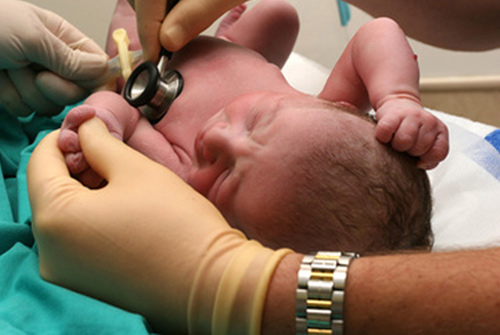
Research shows that brain damage caused by oxygen deprivation in newborn babies can be diagnosed using a blood test that detects changes in gene expression.
An international team of researchers, led by scientists at Imperial College London, tested 45 babies that had experienced oxygen deprivation at birth to assess whether it was possible to predict later brain damage by testing how proteins were expressed in the blood.
Follow-up data collected between the age of 18-22 months showed that half the children had a good neurological outcome and half a poor outcome. Results from the early blood tests showed that those that had a poor outcome could be predicted based on changes in the expression of 855 genes in the blood shortly after birth.
Although it is known that oxygen deprivation during birth can lead to brain damage, the effects vary significantly from one baby to another and it can be hard to predict long term impact.
Early interventions such as extreme cooling of the body and injections of the red-blood cell production stimulator erythropoietin, either separately or in combination, have been shown to help prevent serious neurological damage in these infants. However, it would be useful for clinicians if they could assess which children were most in need of the therapy.
“We know that early intervention is key to preventing the worst outcomes in babies following oxygen deprivation, but knowing which babies need this help, and how best to help them, remains a challenge,” said Paolo Montaldo, MD, PhD, a researcher at the Centre for Perinatal Neuroscience at Imperial and first author on the study, which was published in the journal Scientific Reports.
The babies in this study were recruited in India and were participating in a trial of extreme cooling to treat symptoms of oxygen deprivation. This technique has already been widely used in high-income countries, but can be harder to apply safely in low-income settings. Even after cooling, up to 55% of babies with moderate-to-severe oxygen deprivation go on to develop symptoms of brain damage as they get older.
Of the 855 genes showing differential expression in the 23 babies who had a poor neurodevelopmental outcome, 61% were over-expressed and 38% under-expressed. Two genes in particular, RGS1 and SMC4, which are both thought to be involved in the body’s neuroinflammatory response to low oxygen levels, showed the most significant differences in expression.
The researchers now want to test whether they see the same effect in a larger group of newborns and investigate the function of the differentially expressed genes further.
“The results from these blood tests will allow us to gain more insight into disease mechanisms that are responsible for brain injury and allow us to develop new therapeutic interventions, or improve those which are already available,” senior researcher and co-author on the study Sudhin Thayyil, M.D., Ph.D., a professor at the Centre for Perinatal Neuroscience at Imperial.











